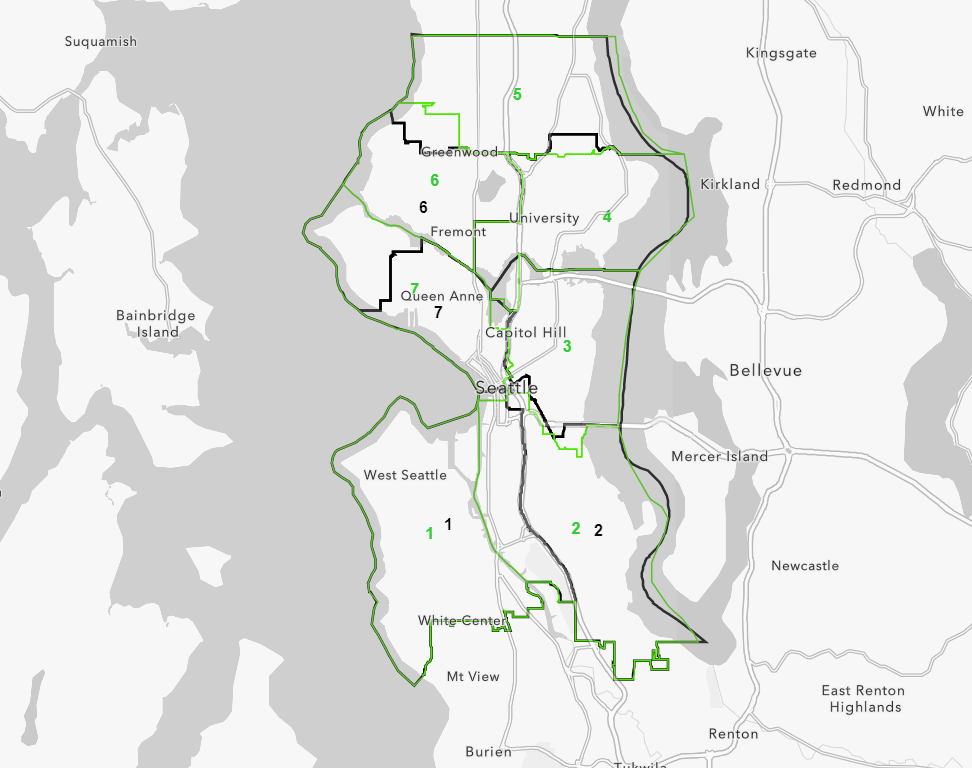
Our deep dive into the seven Seattle City Council races happening this year started with the three races with incumbents running and followed with hotly contested open seats in Districts 1 and 3. Now we dig into two remaining open races in Districts 4 and 5 in North Seattle.
Jump to your district:
- District 1: West Seattle (New window)
- District 2: South Seattle (New window)
- District 3: Capitol Hill (New window)
- District 4: Laurelhurst, University District
- District 5: Aurora, Lake City
- District 6: Ballard, Fremont and Magnolia (New window)
- District 7: Downtown and Queen Anne (New window)

In last week’s piece, I touched on general dynamics in Seattle municipal races (and laid out how the democracy vouchers program works). The two candidates to make it through the primary typically are a progressive and a centrist. The Stranger endorsement usually signals the progressive who will make it through and The Seattle Times endorsement generally signals the centrist to make it through. Incumbents Tammy Morales, Dan Strauss, and Andrew Lewis all had The Stranger’s endorsement in 2019 and won in that progressive wave year.
District 4: Greater U District
Councilmember Alex Pedersen is thankfully hitting that dusty trail and an interesting race to replace him has emerged. Progressive urbanist Ron Davis and business darling Maritza Rivera appear to be the leading contenders to make it through the primary.
However, Kenneth Wilson has been leading the pack in fundraising and could claw his way through in the homeowner backlash lane. Wilson was shellacked by Teresa Mosqueda running citywide two years ago. He’s recycled the same positions but perhaps gotten a little savvier, more gently couching his anti-housing stances in treehugging this time around. It still boils down to forcing renters to live only along busy, polluted arterials that are legally and physically segregated from the rest of the city’s canopied, single-family affluence. Likely leaning on supporter lists from his ill-fated citywide run, Wilson’s D4 run has received a distribution of $48,050 via 1,922 vouchers as of late last week. The Washington Public Disclosure Commission reports he’s raised more than $64,000 to date.
Maritza Rivera meanwhile is running a tough on crime campaign, with little else mentioned on her campaign webpage thus far. Born in Puerto Rico and raised in the Bronx, Rivera has been a centrist foot soldier going back to her time as aide to former City Councilmember Tom Rasmussen. She served in the Durkan administration and then Harrell’s as Deputy Director of the Department of Arts & Culture. “She won’t rest until we get to 5-minute response times for priority 911 calls, take home and car break-ins seriously, get guns off our streets and out of our schools and shut down open-air drug markets,” her webpage boasts. She has yet to qualify for democracy vouchers.
George Artem is also running. Pro-charter schools and a private school grad himself, Artem describes himself as an engineer working on a dogecoin payment pathway. (Better hurry up before that cryptocurrency vaporware loses all value.) According to his priorities page, he’s for stiffer drug penalties, somehow solving homelessness without increasing funding, rent control, and requiring large developers to offer a rent-to-own pathway, which sounds like a legal quagmire but is a novel idea nonetheless.
Matthew Mitnick, a UW grad student, was running as an abolitionist socialist campaign he said was powered by a youth-led movement. The catch was that some of that youth movement say they were duped into working without pay and the issue festered as Mitnick struggled to qualify for democracy vouchers and showed little interest in traditional fundraising. Hence his campaign was tight on funds, potentially afoul of child labor laws, and on its third campaign manager after starving out and butting heads with the first two. Bailey Medilo, a young rising star socialist urbanist from South Seattle, was the first of those campaign managers and they helped Mitnick secure the endorsement of the Seattle Democratic Socialist of America chapter. Shortly thereafter, Mitnick seemed to have deemed Medilo expendable. But firing them caused blowback. It’s hardly the energy of a winning campaign, especially a labor-focused socialist one. Seeing the writing on the wall, Mitnick announced he was bowing out of the race earlier this month.

Ron Davis thus appears the most obvious option for progressives, and he has lined up an impressive set of progressive endorsements including King County Councilmember Girmay Zahilay — both employ Upper Left Strategies as their consultant. At first glance his Harvard-educated tech entrepreneur pedigree might seem upper crust, but Davis’s rags to riches story and passion for pursuing housing abundance and lessening wealth inequality could convince progressive voters he’s a worthy antidote for Pedersen. He’s penned op-eds for The Urbanist and other publications and is a boardmember at sustainability-focused nonprofit Futurewise, honing his chops as a wonk not afraid to wade into policy details. His housing platform is meaty with clear priorities like “eliminate bans on missing-middle housing” and “make Alternative 6 part of our Comprehensive Plan,” as he opined in The Urbanist. On transportation, Davis’s priorities include rededicating road space to bus lanes to speed up high frequency buses and ungap the map of safe bike facilities. Davis also reports he will pass Wilson with the next batch of voucher allocations that should put him past $64,000 raised. Read our interview with Davis.
Rumors are swirling that Rep. Gerry Pollet is also planning to enter the race with the legislative session freshly wrapped up, freeing him up to campaign. Pollet earned “zero” billing in The Urbanist’s last two installments of our annual Heroes and Zeroes feature for his work that ended up sabotaging bills focused on increasing housing supply. Whether Pollet makes the leap and catapults into the lead in the center lane or simply splits votes with Wilson, dooming both and clearing the path for Davis and Rivera to make it through the primary remains to be seen. As it stands with Mitnick’s departure, D4 has just four candidates, a far cry from the 10 declared in D3.
If somebody is fighting Davis in the progressive lane for The Stranger nod, it hasn’t become obvious yet. If Pollet doesn’t jump in the race, Wilson likely has the inside track to The Seattle Times endorsement over Rivera since Wilson won it in 2021 too. Given his bruising 19-point loss to Mosqueda, it’s fair to question how strong of a candidate Wilson would be. But he does speak the Blethens’ language of homeowner backlash.
District 5: Far North Seattle
Council President Debora Juarez is not running for election, which is leaving an open race that appears pretty wide open at this time. Nilu Jenks, Justin Simmons, Shane Macomber, and ChrisTiana ObeySumner appear to be the most viable candidates thus far. Jenks is the only D5 candidate to qualify for democracy vouchers thus far.
High schooler Lucca Howard is also in the race as an unabashed urbanist, running to expand bus lanes and transit frequencies and ramp up a social housing program paid for by a vacancy tax.
Cathy Moore and Peter Kithene Wilson (no campaign site for him yet) have also declared. Moore is former King County Superior Court judge, former Seattle public defender, and former Chair of the Seattle Human Rights Commission running on a vaguely tough on crime platform.
Nilu Jenks has a bit of momentum after fellow candidate Sinh Tran suspended his campaign and endorsed Jenks. Increasing housing affordability, building sidewalks, leading on climate change, and public safety are her main campaign themes so far. Jenks’ priorities page includes a detailed and balanced plan to increase public safety that includes alternate response models. Her housing affordability plan is also a balanced approach running the gambit from affordable housing funding, streamlining permitting and “more multi-family housing in areas currently zoned for single-family homes.” She wants in invest more to close gaps in sidewalks, which plague the far north and south of Seattle, and “expanding the city’s public transit infrastructure, particularly increasing the number and frequency of bus services to connect Light Rail to neighborhoods. Require that these buses be electric.”
Justin Simmons, a leader with Broadview Community Council and 46th Democrats, appears to be running in the center homeowner-whisperer lane. With parents and a grandmother who were principals at Seattle Public Schools, there’s big time principal energy here. The first of many centrist endorsements listed on his site is that of former Port Commissioner and current housing obstruction consultant Peter Steinbrueck, who is also listed as “honorary campaign chair” — the first of several warning signs for urbanists. He has no issues page, but his endorsements and biography page underscore how well-connected and old Seattle he is. Obligatory picture with former President Bill Clinton, check. Corporate fundraising for United Way of King County, check. Reference to number of generations family has been in Seattle, check.
Shane Macomber is a Maple Leaf realtor who works as a payee coordinator for Compass Health. His issues page is mostly platitudes, but he does express support for creating a social housing developer as laid out in recently passed Initiative 135. Additionally, he’s an urban farming fan: “Expand our city’s P-Patch programs in a way that explores urban farming as a partial solution to food deserts in North Seattle.” He’s raised more than $12,000 so far, leading the field, but Jenks’ democracy voucher infusion should spring her into first.
ChrisTiana ObeySumner is an equity consultant and disability rights advocate who has been active on several boards and commissions. Their priorities page emphasizes housing, homelessness, and community safety. ObeySumner supports denser zoning and a vacancy tax to fund affordable housing. It appears they would prefer for Seattle’s Mandatory Housing Affordability inclusionary zoning program to require on-site affordable housing rather than the often-used option of payment in-lieu of development fees that funds affordable housing construction elsewhere. Their community safety platform emphasizes alternatives to policing and prevention in addition to a community policing with conventional law enforcement officers. ObeySumner served on The Urbanist Elections Committee during the 2020 Primary.
At this juncture, it appears Jenks has the inside track in the progressive lane and Simmons for the centrist nod via Seattle Times endorsement, but much could change in this late-developing race.
Doug Trumm is publisher of The Urbanist. An Urbanist writer since 2015, he dreams of pedestrian streets, bus lanes, and a mass-timber building spree to end our housing crisis. He graduated from the Evans School of Public Policy and Governance at the University of Washington in 2019. He lives in Seattle's Fremont neighborhood and loves to explore the city by foot and by bike.


